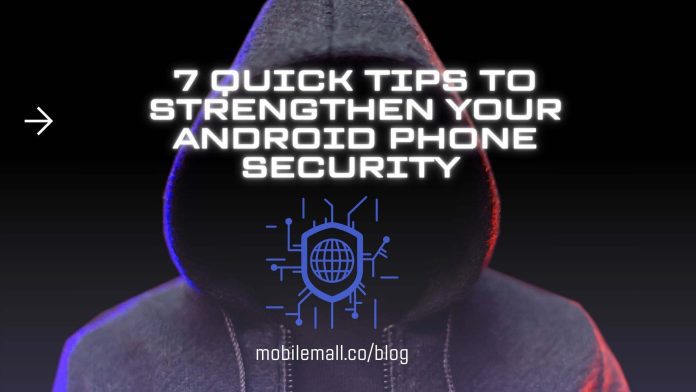You probably know how important it is to keep your Android device safe and secure, especially in this digital age where cybercrimes are rampant and evolving. Imagine what could happen if hackers or thieves get hold of your personal data, such as your contacts, email, name, and photos. You could face serious consequences, such as identity theft, data breaches, and financial fraud. You don’t want that to happen, right? As an Android device user, keeping your device safe and secure is essential, considering that cybercrimes are on the rise and are here to stay for a long while. Suppose cyber criminals gain unauthorized access to your data. In that case, you will have to face consequences, including financial fraud, identity theft, and data breaches, and you’d want to avoid that at all costs. Cybercriminals are getting competent in the way they steal users’ data, and that’s why it’s necessary to implement security measures that ensure your data is protected from malicious actors and third parties.
You’ve come to the right place since this guide outlines all the steps you can take to protect your Android device and ensure it doesn’t get compromised. We’ll walk you through the most effective security measures you can implement today. So, if you’re ready, let’s get started.
Why Should You Secure Your Android Device?
There are many reasons why securing your Android device is a smart move:
- Privacy Matters
When you secure your Android device, you ensure that your personal and sensitive information stays private and safe. Hackers or thieves could use your data for identity theft and other scams, which could ruin your reputation and cause you a lot of trouble.
- Data Loss Prevention
If you lose your device or it gets stolen, you don’t have to worry about losing your data as well. You can encrypt your device and use remote tracking/wiping features to safeguard your data. This way, you can prevent your data from falling into the wrong hands and being misused.
- Identity Theft Protection
Hackers or thieves could access your device and use your personal information to impersonate you online, which could have serious consequences for your personal and professional life. A well-secured device is a shield against identity theft.
- Financial Security
If you have banking apps or digital wallets on your Android device, you need to protect them from hackers or thieves who could access your accounts and steal your money. Security is also important when you make online transactions or purchases, as it prevents hackers or thieves from intercepting your data.
- Malware Protection
Android malware is a real threat to your device and your data. It can compromise your device and your data, steal your information, and disrupt your device’s normal functioning. Securing your device helps you protect it from malicious software.
- Corporate Security & Family Protection
If you have children who use your Android device, you need to secure it to monitor their online activities and ensure their safety. You can create a safe digital environment where you can control their app usage and limit their exposure to inappropriate content.
Read Also: Tyrone’s Unblocked Games: Multiplayer Platform
7 Tips To Enhance Your Android Device’s Security
- Be choosy about apps. Don’t just download any random game or app that looks interesting. Stick to ones from developers you know and trust, like Google or big name companies. Before installing, do a quick search on the app to see what others say. If it seems sketchy, trust your gut and skip it.
- Use strong passwords and two-factor authentication (2FA). Come on, you know better than “password123” right? Mix up uppercase and lowercase letters with numbers and symbols. For accounts with sensitive info, turn on 2FA for extra protection. You’ll get a text with a code to enter when logging in. Annoying but worth it!
- Update, update, update. Don’t ignore those system updates and app notifications. They often include important security patches. Make a habit of manually updating apps too by checking the Play Store for new versions.
- VPN it up. VPNs add encryption to keep your web browsing secure on public networks. Bad guys can spy on what you’re doing otherwise! There are affordable VPN options out there. Using a VPN app for Android ensures that personal and confidential data will not be compromised. A VPN also protects sensitive data when using a public network. Public networks are the most vulnerable to cyber attacks, so a reliable VPN service will keep your data safe and secure.
- Chat securely. When messaging friends, use apps like WhatsApp or Signal that have end-to-end encryption. That means only you and your bud can read the messages. Keep private convos private, ya know?
- Only Play Store. Stick to downloading apps from the Google Play Store rather than third-party sites. Google vets the apps there for safety. Better safe than sorry!
- Get an antivirus. Antivirus apps like Avast and AVG can scan for and remove sneaky malware. Run periodic scans when you think about it. Having that extra layer of protection brings peace of mind.
Keeping your Android device secure takes a multifaceted approach that involves protecting your personal information, preventing financial loss, and protecting against Malware. By implementing the best security practices from the beginning, you wouldn’t have to spend time, energy, and money to eradicate the issues that came about from falling victim to cyberattacks. Here are the best steps you can take to keep your device safe.
Read Also: Xrare: A Machine Learning Method
Conclusion
Cybercrimes are at an all-time high, and as Android users, it is our responsibility to protect our devices against cyberattacks and online threats and protect our data from getting compromised. By implementing these easy-to-follow security measures, you can officially say goodbye to being a victim of cyberattacks while keeping your sensitive data safe and secure.
